Bridgerton’s Reimagining of Regency Society
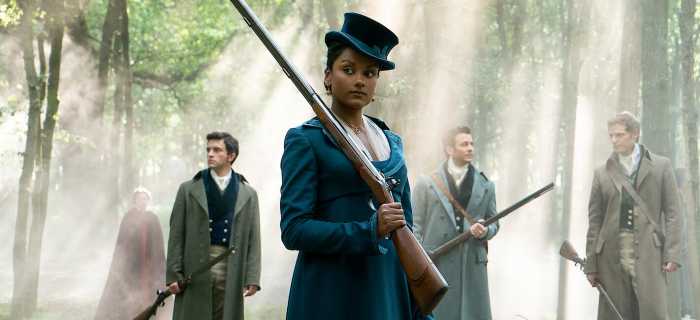
Bridgerton is an extremely popular show. The second season itself is the most watched English-Language series debut on Netflix with a record 627.11 million hours viewed in its first 28 days. As the Vox article written by Aja Romano explores, many have praised and rebuked the show’s modernization and use of actors of color. Some say it’s not enough, some say it’s progress, and some say it’s too progressive. After the show’s debut season, arguments spanning from the show’s lack of racial commentary to the use of actors of color not being historically accurate became fairly widespread.
In observing the characters and specific scenes between the characters of color, we can find the showrunners at Shondaland are trying to find a balance between the conventions of the regency period drama and inclusion of people of color. Regency period dramas are predominately white and heterosexual romantic stories that do not focus on darker aspects of racial inequality of the time. The characters of Queen Charlotte and Will Mondrich are important examples of how Bridgerton is reimaging race and culture in an alternate regency society. Lady Danbury’s conversations with Simon Bassett and Kate Sharma also show small but definitive examples of establishing conversations on race and culture in the show. These examples show Bridgerton’s reimaging of regency society is a balancing act of adding characters of color and the conventions of the regency period drama.
Queen Charlotte Rules the Ton
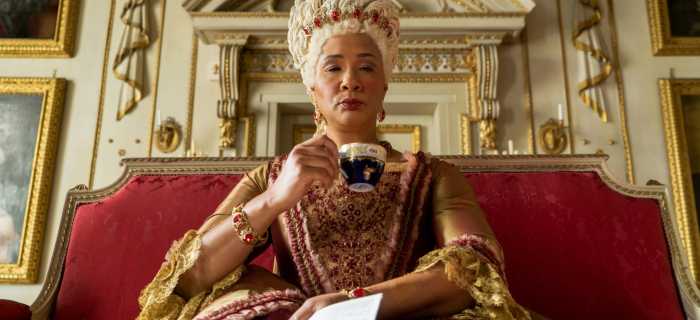
Queen Charlotte is the basis for the racial integration of Bridgerton’s society. She and the King made a love match that then bolstered people of color in London regency society, which we learn from Lady Danbury in Season one during her important conversation with Simon. Throughout both seasons Queen Charlotte, a woman of color, is the highest ranked person we see throughout both seasons. In season 2 we see the King, but he seems to have dementia and is unable to perform many tasks. Due to this fact, Queen Charlotte seems to be running the country as well.
In the last episode of Season 2, she helps the main couple by using her power in the ton. She tells the ton that the reason that the marriage between Anthony and Edwina that she orchestrated did not happen was because she no longer wished it. This was a lie because the marriage did not happen because Anthony was in love with Edwina’s sister Kate, but the ton did not question Queen Charlotte’s actions because of her status and power in their society.
Another interesting point is that Queen Charlotte being mixed race is historically accurate. Bridgerton seems to be one of the only regency-set shows or movies to have the highest-ranking women be the highest-ranking person and be a person of color. No movie or show adaptation of Jane Austen’s works or the movies Belle or Mr. Malcolm’s List has the highest ranking character portrayed by a woman of color. Since there is historical proof of a high-ranking women of color in regency England, then it seems the show portraying this is accurate and needed in the genre of regency England dramas. There is also an example of lower-ranking people of color in Bridgerton’s society that fully round out this new reimaging.
Will Mondrich, Working Man
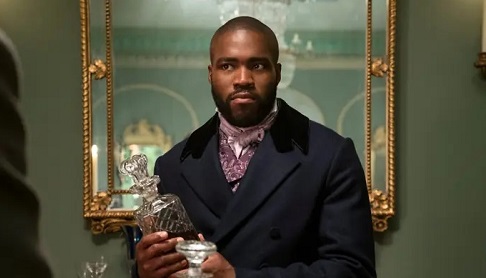
The character of Will Mondrich is also imperative to the reimaging of Bridgerton society. Will, a character of color, is a part of the working class. He is therefore one of the lowest ranking characters on the show and yet one of the most interesting. In Season 1, Will is a boxer that is the best friends with Simon Bassett, Duke Hastings. Throughout the 1st season, Will acts a voice of reason and as a grounding presence for Simon who is navigating the ton. Will reminds Simon of his privilege because he has to fight to provide for his wife and children. At the end of season one, Will purposely loses a fight for money to financially take care of his family not have to fight anymore.
Season 2 finds Will after making his morally ambiguous choice to purposely lose a fight for money. Will decides to create a club with his new financial status. His club is for everyone, no matter their place in society, which is different from White’s, the ironically named club that the Bridgerton men and other high men of the ton attend. As he tries to upstart his club, he struggles with his view of himself and his honorability. This comes to a head when Will can see the new Lord Featherington is scamming the ton. Will finally admits his choice to lose a fight for money to convince Colin Bridgerton not to invest in Lord Featherington’s scam jewel operation. At first, Colin seems to take the side of Lord Featherington. Then, after Colin exposes Lord Feathering ton, he brings his acquaintances to Will’s club to thank him for looking out for him and the others in the ton.
Though a low member in this alternate regency society, Will’s unique storyline provides an interesting look at the class status and moral choices of those not high-standing. This characterization is showing an array of characters of color from different backgrounds. At the same time, many of the higher members of the ton respect Will and take his opinion seriously. Though Will’s characterization is one way the show balances the genre requirements and includes characters of color, there are some short but important conversations also show the balancing act of reimaging regency society.
Lady Danbury and Simon Disagree
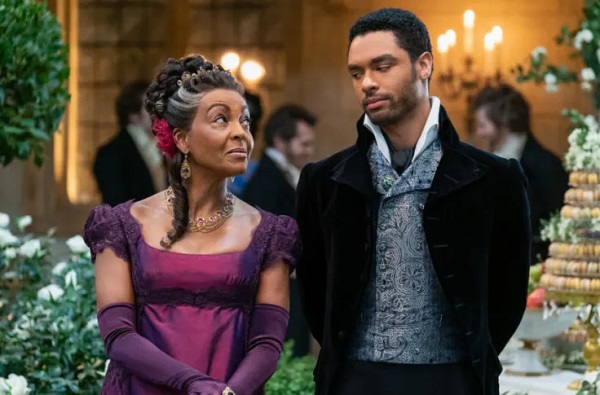
In season 1, episode 4 Lady Danbury speaks to Simon Bassett, and they have one of the very few conversations about race in the show. The conversation goes as so:
Lady Danbury: I understand that you believe such subjects as love and devotion, affection, and attachment, you find it all trite and frivolous. But have you any idea those very things are precisely what have allowed a new day to begin to dawn in this society? Look at our queen. Look at our king. Look at their marriage. Look at everything it is doing for us, allowing us to become. We were two separate societies, divided by color, until a king fell in love with one of us. Love, Your Grace… conquers all.
Simon Basset: I believe that remains to be seen. The king may have chosen his queen. He may have elevated us from novelties in their eyes to now dukes and royalty, and at that same whim… he may just as easily change his mind, a mind, as we all know, that is hanging on by one very loose and tenuous thread. So, no, I am sorry, Lady Danbury, we disagree here. Love changes nothing.
(Bridgerton, Season 1 Episode 4)
During this exchange, we see them set up the alternate reality for the regency period. Lady Danbury is discussing the positives of the mixed-race marriage of Queen Charlotte and her king and how it helped people of color gain access to society. We also see Simon rightfully questioning if this alternate reality is sustainable. He’s acknowledging the fragility of people of color’s place in this society. Lady Danbury has another interesting conversation with a main character of color in season 2.
Kate Despises English Tea
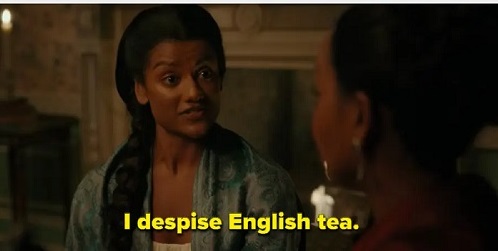
In the first episode of season 2, Lady Danbury has a conversation with the new lead love interest, Kate Sharma, a woman of color. Kate is an outsider in Bridgerton’s society because her father was Indian and was not titled. Her birth mother was also not English or titled. After Kate’s stepmother, Lady Mary Sheffield, married her father, her parents disowned her. Mary’s parents do not see Kate as an equal. The Sheffields will take care of her mother and give her sister, Edwina a dowry, but only if Edwina marries a titled Englishman. Lady Danbury tries to understand why Kate is not searching for a husband herself and why her sister’s grandparents are planning to give a dowry to her sister Edwina. The conversation goes as such:
Lady Danbury: And what about you?
Kate Sharma: If I could marry for the sake of my family I would. But I am not my mama’s daughter by birth. Edwina is.
Lady Danbury: Oh
Kate Sharma: I’ve spent the last eight years raising my sister to walk in the right way, to talk in the right way, to play the pianoforte just so. Teaching her twice as much and watching her work twice as hard as anyone else. I even taught her how to make this pitiful excuse for tea the English so adore. I despise English tea. But if it means my sister will not be left destitute, then I will smile, and I will nod politely after each and every sip, to be sure .
(Bridgerton, Season 2 Episode 1)
Kate here is describing how outside of English society she is and how she detests it. She hates the titles, formality, and even the tea. She’s only performing for English society so that her sister and mother will be safe. Kate plans to return to India after her sister is married because she knows that the Sheffields won’t support her. Though her plans change after falling in love with Anthony Bridgerton, during the season Kate is constantly going against Bridgerton’s social rules by riding alone and shooting. Her telling conversation with Lady Danbury, in the beginning, is her questioning how English society works and why she does not wish to succumb to it.
The Future of the Ton
Despite what many critics think, there is an intriguing discussion on race and culture. Aja Romano explains:
Ultimately, whether you think Bridgerton is satisfactorily race-conscious or not boils down to the way you read the show itself. Viewers who read the show as consciously escapist are more likely to see its use of Black characters as fitting within an escapist milieu — racism is vaguely acknowledged, but not enough to encroach on the fantasy of a history in which Black communities could leverage social power and climb to the heights of the aristocracy.
Though race and culture are not the focus of the show, and especially not its source material, the small discussions and character placement ignite interesting discussions. Salamishah Tillet from The New York Times explains:
…the characters of “Bridgerton” never seem to forget their blackness but instead understand it as one of the many facets of their identity, while still thriving in Regency society. The show’s success proves that people of color do not have to be erased or exist solely as victims of racism in order for a British costume drama to flourish.
The race is a part of the characters of color’s identities but not the sole trait that might be more powerful. To have people of color see themselves in the glitz of the regency world without traumatic storylines based on race could provide a sense of belonging in an entertainment niche they didn’t feel a part of before. It will be interesting to see what the show does in the future, especially since there will be a spin-off series focusing on Queen Charlotte coming soon. Though Bridgerton does not intensely focus on race/culture, by including characters of color that are from different ranks of society, it is pushing the boundaries of previous regency-based shows and movies. The delicate balance of following the genre norms and including characters of color brings a richness to the genre that has not been apparent before.
What do you think? Leave a comment.











I’m not personally a fan of Bridgerton but I think this work does a well enough job in discussing the topic. I would ask for a bit more depth about the ideology behind the racially neutral casting and what it says to imagine Black people in the royal family after all the things stolen from Africa by the Royals is a decision that deserves some analysis.
Lovely article. As noted, I especially enjoy Queen Charlotte’s character and her depiction as a mixed-race woman. I’ve read a few Regency or other historical titles with protagonists of color or mixed heritage, but they’re still fairly rare, and I’d like to see more of them, so as many as we can get, as long as they’re well-written and fair.
Sunni,
Thank you for the feedback!
Stephanie,
Thank You!
I’ve enjoyed the Bridgerton books as light relief but can’t understand why you would them into a series.
I discovered Georgette Heyer about 5 years ago and this year especially I’ve found myself re-reading (or listening) on a loop. I can’t understand why there haven’t been any tv adaptions as the dialogue is just there to be spoken. It’s as plain as a pikestaff dash it and it’s a cork brained thing not to do it and I’m blue deviled about it!
This is such silliness! I am loving it!
For all its now-ness with a diverse cast, both the storyline and the dialogue are pretty inane. I gave up after two episodes.
It’s basically a Mills and Boone novel with a big budget. And immense fun if approached in that spirit.
Although it has thrown out the old rules for period-drama casting (which is ok) it conveys nothing very intelligent in its script and largely ignores period mores. A soapy plot with risible lines conveyed in contemporary language, with the odd anachronistic flourish displayed to make it seem a tad Georgian. It is essentially a Jane Austen fancy-dress party with a fly-on-the-wall camera, but that sort of thing seems to attract large audiences, so here we are.
The only really clunky mistep in S1 was when one of the characters tried to explain the presence of so many non-white characters among London society. But the reason the various anachronisms were so easily accepted by most if the audience is because it was so obvious it was not pretending to be historically accurate. Trying to explain things just drew attention to the anachronisms.
Yes, I agree. People will accept a fantasy world if it is compelling in its own right, without too much exposition. There is no need to start lifting up the floorboards.
It was only a brief moment, easily ignored, but actually raised an interesting question – what might the world look like if our ancestors had been more inclusive? Of course everyone knows it’s not real, but fiction can get people thinking. History is what happened, but it wasn’t inevitable that it had to happen a certain way. That influences how we think about the present and future.
Firstly I doubt many of the audience tuned into Bridgerton to have interesting questions raised.
But also the question you’re suggesting is being raised is pretty facile, isn’t it? If our ancestors (by which I take it you mean British during the era of colonialism and Empire) had been more inclusive, then all the other imperial powers of that time would still have got on with the business of conquering and colonising, because that’s the history of pretty much everywhere for pretty much the whole of recorded history.
It’s not even a period drama really. More a fantasy romp.
And that’s why people liked it!
Precisely what made it so entertaining. Period dramas can be good, but there are so many already, this was a refreshingly joyous bit of variety.
Probably following the Netflix formula of starting off different or controversial, then once it gets popular the stuff that made it interesting gets sucked out of it until it’s cancelled in S3.
It’s already renewed for seasons 3 & 4.
I thoroughly enjoyed Bridgerton, and similar fluffy-but-fun TV. I also own all Jane Austen’s books and most of Dickens, quite a lot of George Eliot, and have read Les Misérables (all 1000+ pages of it) in both English and French. Oh, and my bookshelves also contain lots of lighter fare (there’s Terry Pratchett, there’s chick lit, etc etc). It is possible to enjoy different forms and styles of art and literature. It’s not a binary choice. Sometimes you want deep philosophical engagement on 18th-century politics, and sometimes you just want Regé-Jean Page.
I’ve just watched the first episode of S2 and I loved it. I like how the Queen was more natural in this season, whereas she was a bit stiff last season. And I love Lady Danbury and Dowager Viscountess Bridgerton.
I’m two episodes in and really enjoying it. The perfect antidote to these dark times.
Love period dramas but couldn’t get past the first episode of season 1. Got to be the most overrated programme since Killing Eve/Fleabag.
This technique of judging everything by the first episode is problematic.
I have to say I have thoroughly enjoyed the series. Well cast and great storyline throughout. Bring on the next series!
I binge-watched the second season and here’s my two cents: First off, Jonathan Bailey is terrific. I haven’t seen unrequited longing done so well since Laurence Olivier in Wuthering Heights. I thought his character was interesting and complex when I watched Season 1 and he was the most interesting character in Season 2. I wish I could say the same for Simone Ashley. So much potential but their pairing was flat. Even the ‘almost kissing scenes’ had no fire. Perhaps it was the directing but her character come off as mean and uninteresting. And ‘mean’ without depth. No chemistry IMO.
Sorry. I really wanted them to ‘work.’ The Eloise character, IMO, is silly. I know what the director is trying to do but she just comes off as silly, immature and awkward. However, the 2 scenes where the actor showed what she is capable of were the scenes at the Ball, when she realizes that Penelope is Whistledown, and the confrontation scene in the bedroom. No quarter given, she did not fall victim to Penelope’s ‘I’m sorry, tear tirade.’ Those scenes were well done. And speaking of Penelope, I dislike her character most of all…which means, I guess, that the actor has nailed it. Petty, mean and conniving. But again, without depth. I mean, why is she so petty? That’s an area the writers could explore.
I was actually happy when she overheard Colin say he would never date her (although I foresee that being turned into a ‘peer pressure’ admission. Penelope is a plus sized woman so admitting to the guys, who were already dogging him about dancing with her, that he liked her would be a no-no.) Ruth Gemmel as Lady Featherington was enjoyable. That woman knows how to survive. And her storyline really highlights the unfairness of the inheritance laws of the time. The other main characters were fine but they all lacked an ‘edge.’ Everybody caught ‘feelings’ in this Season and it made the entire thing, overall, lack a punch, lack sharpness. Just…flat. And none of the characters were interesting enough to carry an entire main theme storyline for a Season 3. Except Jonathan Bailey, and he got married, so his angst is over. Sadly.
That was more than 2 cents.
It’s like an Apologetic Downton Abbey, with everyone too silly and afraid to say anything that’ll hurt the feelings of someone watching it a century in the future.
Are you upset about the black, aristo characters?
This series foists too much anachronism. If one cares at all about historical accuracy in historical accounts, there is no reaction available but a sense of offended intelligence. Next thing you know one of the characters is going to check their wristwatch. Clearly people will watch anything if the actors are attractive and have lots of simulated sex.
I think fob watches were around in the town of BRIDGERTON.
And sundials?
I watched one episode and thought it deeply uncomfortable and sinisterly revisionist even more so than Downton Abbey that return to the golden time for the rich when everyone ‘knew their place’. A period of history when women either toiled all day or, if they had some dosh, did nothing but needlework and waited for an appropriate bloke to wed, forget about equal rights. The only non-white people to be seen were a few novelty footmen, most others in the empire were being enslaved or exploited. Pure fantasy, the reality would appal us.
Okay, calling it “sinisterly revisionist” is ridiculous. The series is an adaptation of a very popular series of historical romance novels. The vaguely historical setting and costuming is just a pretty setting for the will-they-won’t they stuff. No-one is pretending this has anything to do with the actual regency period. The choice to cast an ethnically diverse cast is simply so that A) you have a wider choice of hot actors to chose from and B) a wider range of people might tune in. It IS pure fantasy, and that is exactly the point.
My 17-year-old daughter is on season two but suggested we watch season one together. I’ve only seen two episodes but this show is SO MUCH FUN! The costumes, the hair, the furniture, the sexual tension… I love it.
You can’t help but be reminded of how the royals treated Meghan, Harry’s wife
While I certainly count myself among those who thoroughly enjoyed the ridiculous, sexy, consuming fun of Bridgerton Season 1, I found Season 2 to be more heartfelt, compelling, and satisfying.
Anyone who has experienced the sudden death of a parent early in life, or who loves someone who has had this experience, knows that it irrevocably and uniquely changes each person in the impacted family. From my own experience with both family and friends I have seen the tragic and sudden death of a parent rip people to shreds, alter their personalities, change how they see themselves and everyone around them, the impact goes on and on and on.
When I saw Edmund Bridgerton die in the arms of his son Anthony, and the way the adults around Anthony responded to him in that very moment, all of Anthony’s manic, controlling, bullying self-destructive behavior made sense. Jonathan Bailey made me feel it. Ruth Gemmell’s portrayal of the devastating grief felt by Violet Bridgerton, when she shows us Violet’s inability to be there emotionally for Anthony after his father’s death, and when she later confesses her acknowledgement of that absence to him, it all felt so true to me I found myself sobbing.
Similarly, I found Simone Ashley’s portrayal of the hyper focused Kate Sharma instantly relatable. Her reaction to the loss of both of her parents is to find ways she can control what is happening around her, to the people around her, to the people she loves. I do not know about other viewers, but I found her performance of Kate always bubbling with anxiety right below the surface, the need to be vigilant, the need to control everything and to be so quick to lash out spot on for someone who has experienced trauma.
Evan,
I agree more, it was really moving!
I agree, season two is a much slower burn, more rewarding, effort than than the first season.
I don’t mind colour-blind casting, and in fact I quite like it.
The other evening my girlfriend asked me if I fancied a bit of Bridgerton. I said yes, but I realised I’d got the wrong end of the stick when she started spreading out the red bath towel on the bed.
Americans don’t do period pieces as good as the British, but I know that going in so will watch anyway.
Not my bag, but it entertains my wife on evenings we’re not watching more mutually enjoyable stuff, while I game.
I really think it’s a strong series and much better than the source material and I’m excited to see what they do!
Whilst I have enjoyed Bridgerton, it’s not my type of series. I think the conversations people are having over race are interesting, but Bridgerton’s reasoning for why their lacks racism in the world seems to diminish the actual fight people of colour had for years.
However, I’ve also heard people of colour speak about how nice it is to watch a series where they can see themselves represented in a time period where they weren’t. I believe it must also be nice to not have to watch another film or series solely centred on slavery and racism, as so much media focusing on people of colour tends steer in that direction.
Overall, I find the diversity in Bridgerton awesome, because there’s simply not enough of it in period pieces. I’m also not sure you can expect too much reality from a series that has a violin version of Ariana Grande’s ‘Thank U Next’ playing in the background of a beautiful ball.
a fantastically written piece, however, I do feel that Bridgeton really missed the mark with its’t cinematography, it felt lazy and not very well done. Some of the flash-back scenes were a real eye-sore to look at, and the sex scenes were very dull, like something you would see in a 50 Shades movie. I also think the costume design team missed the mark with the Regency era clothing, making it more stylised instead of accurate.
I love historical fiction — tv, film, books — but could not get through 20 minutes of this show.
That’s because its not really historical fiction. They may be dressed in Regency garb, but the dialogue, mannerisms, gestures, facial tics, and ‘Sherlock’-like floating words are pure 21st century. It’s a fake.
This is a very engaging article with some really interesting thoughts put forward about Bridgeton. I’ve watched both seasons of the show and while it isn’t my favourite considering the origins of the story from the novel series, I think the diversity of the cast was a great decision and should be done more often in shows like this where they aren’t aiming to be historically accurate. Arguments about its accuracy as a period piece are possibly not very strong because it is a stylised version of the past. The showrunners didn’t make it with the intent for it to be another ‘Downtown Abbey’ but rather a fanciful romance, which I think it achieved.
Loved seeing diverse representations on screen! Plus getting to see a south Asian lead was really exciting for me as a south Asian person
A great read, thank you. I do consider that Bridgeton is using the Regency as a set dressing rather than actually being a historical romance text. It says more about our context today than the actual period it is “set” in – and I love it for this!
the race blindness really allows there to be a more immersive experience
I am a big fan of Jane Austen novels and also a big fan of Bridgerton. It’s important to note the use of music in the show. Many arrangements of songs by popular artists for string quartet. They also use Max Richter’s reimagining of Vivaldi’s Four Seasons throughout. They have carried the theme of contemporary culture clothed in Regency England so consistently, it’s in the music. It’s all true to Jane Austen. She was a satirist about the social norms of her time. Shonda Rimes’ version would have made Austen proud I would think!
I love that you put my thoughts into words (more succinct words than I was thinking). This is such an interesting through line of this show!